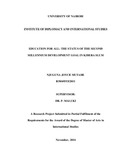| dc.description.abstract | Since the introduction of free primary education in Kenya in 2003, the country has made
remarkable progress towards the realization of the Education for All (EFA) goals.
However, there are sections of the Kenyan society that have continued to lag behind in
the achievement of EFA. Such regions include slum areas, like the Kibera slums in
Nairobi. EFA is concerned with the enrolment of children of school-going-age to school
and is also the subject of the second Millennium Development Goal (MDG). This study
seeks to find out the extent to which the Second Millennium Development goal has been
achieved in Kibera slums of Nairobi. The research study investigates the barriers that
hinder the attainment of full enrolment in primary schools in Kibera slums. The study is
based on Immanuel Kant’s theory of liberal institutionalism. Kant proposed the formation
of international organizations to facilitate cooperation between states. His views have
been modified by neo-liberalists who advocate for international cooperation based on
international regimes. The MDGs constitute an example of a regime. This study takes the
research design of a case study. This design was chosen because it enables the researcher
to trace out the natural history of a social unit and the relationship with the social factors
and the forces involved in its surrounding environment. The design is supplemented by
data obtained through interviews and use of questionnaires. Questionnaires were issued to
two samples of respondents. The first sample was composed of 50 primary school
teachers all teaching in formal and non-formal schools in Kibera. The second sample
comprised of 50 community leaders in various villages of Kibera. 15 other respondents
were interviewed. The study found full enrolment of children to primary schools in
Kibera has not been realized with the respondents approximating that 10 to 15 per cent of
children of school-going-age were missing school. Three main factors were found to
contribute to the failure to realize the aim of the second MDG. The factors are: Extreme
poverty, poor implementation of the Free Primary Education (FPE) programme and the
negative social environment of the life in slums. Both study and policy recommendations
have been put forward. The study recommends that there is need for more study to be
done to determine the extent to which certain aspects of poverty contribute towards the
failure to achieve full enrolment in primary schools in Kibera. Such aspects of poverty
may include HIV/AIDS and disability. | en_US |

